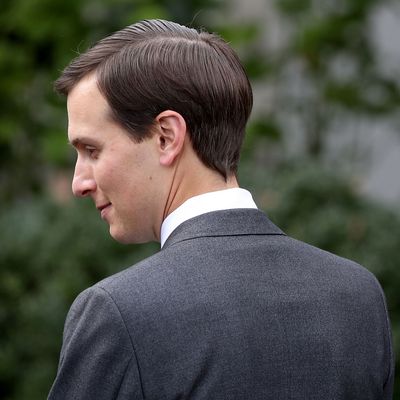
In December 2016, Jared Kushner allegedly instructed Michael Flynn to sabotage American foreign policy in order to help a foreign regime violate international law with impunity. (That regime was, of course, Bibi Netanyahu’s.)
More specifically: The president’s son-in-law told Flynn to call members of the U.N. national security council, and encourage them to block a resolution condemning Israel’s illegal settlements in the West Bank, in defiance of the Obama administration’s wishes.
In making this request, Kushner (arguably) violated the Logan Act — an archaic 1799 statute that prohibits private U.S. citizens from undermining the foreign policy of a sitting U.S. president through contact with a foreign power. No American has ever been convicted of violating the Logan Act (even though a long list of people have almost certainly violated it).
To honor Kushner’s instruction, Flynn contacted Russian ambassador Sergey Kislyak, and asked him to impede the vote against Israel’s settlements. Shortly thereafter, Trump’s first national security adviser told the FBI that he’d never done any such thing. In saying that, Flynn (inarguably) violated the law against making false statements to federal law enforcement.
On Friday morning, Special Counsel Robert Mueller filed documents in federal court revealing that Flynn has pleaded guilty to the crime of lying to federal agents. Those documents stated that a “a very senior member of the Presidential Transition Team” had told Flynn to implore Russia (among other UNSC nations) to block the resolution. Former members of the Trump transition team subsequently told Bloomberg, BuzzFeed, and NBC News that Kushner was that “very senior member.”
Meanwhile, the Associated Press reports that another anonymous transition official referenced in those documents — one who allegedly discussed U.S. sanctions against Russia with Flynn, around the time when he spoke to Kislyak — is ex–deputy national security adviser (and current nominee for ambassador to Singapore) K.T. McFarland. Shortly after Flynn departed the Trump administration last winter, the White House recruited retired vice-admiral Robert Harward to be its new national security adviser. But Harward turned down the job, after Trump (reportedly) refused to allow him to fire McFarland. At the time, journalists had difficulty understanding why the administration was willing to sacrifice Harward for McFarland’s sake.
Anyhow, according to the former transition official who spoke with BuzzFeed, Flynn characterized defeating the UN resolution against Israel as a “top priority for the president”:
“Jared called Flynn and told him you need to get on the phone to every member of the Security Council and tell them to delay the vote,” the person said.
If confirmed, that call would bring prosecutors one step closer to Kushner, who also serves as a senior adviser to Trump.
Kushner, the source said, told Flynn during the phone call that “this was a top priority for the president.”
The source says Flynn took the call at the Trump transition team’s offices in the General Services Administration headquarters in northwest Washington. After hanging up, Flynn told the entire room that they’d have to start pushing to lobby against the UN vote, saying “the president wants this done ASAP.”
In a statement Friday, Flynn denied the “false accusations” that he committed treason or “other outrageous acts” against the United States. But he admitted that he erred in lying to the FBI, before saying, “My guilty plea and agreement to cooperate with the Special Counsel’s Office reflect a decision I made in the best interests of my family and our country. I accept full responsibility for my actions.”
In his conversations with Kisylak last December, Flynn also spoke about U.S. sanctions against the Putin regime. In January, he denied having broached that subject with the Russian ambassador — and Vice-President Mike Pence vouched for that claim. Unfortunately for both of them, Kislyak was under routine surveillance by the U.S. government, and a recording of their phone call exposed his fib (eventually, the Washington Post did, too). Trump subsequently fired Flynn, supposedly for having lied to the vice-president.
Given the severity of the accusations against Flynn, one would imagine that he provided Mueller with something more incendiary than what is currently public. Kushner’s behavior could constitute a violation of the Logan Act — but that law is widely considered a dead letter. What’s more, the Trump team’s interest in derailing the U.N. resolution was hardly a secret. The president-elect was openly undermining the sitting president’s foreign policy over Twitter. Meanwhile, the fact that Flynn lied to the FBI about his contact with Kislyak was first reported nearly a year ago.
If this is all there is, it’s hard to see why Mueller would be so accommodating — or why President Trump would have been so preoccupied with protecting Flynn earlier this year.
But then, the fact that Flynn ostensibly felt compelled to lie to the FBI about his communications with the Russian ambassador — but not about conversations he had with other foreign diplomats about the resolution against Israeli settlements — is a bit eyebrow-raising. And anyway, it isn’t hard to think of reasons why Mueller might not be ready to let the public (and thus, Trump) listen in on every tune Michael Flynn has been singing.






























